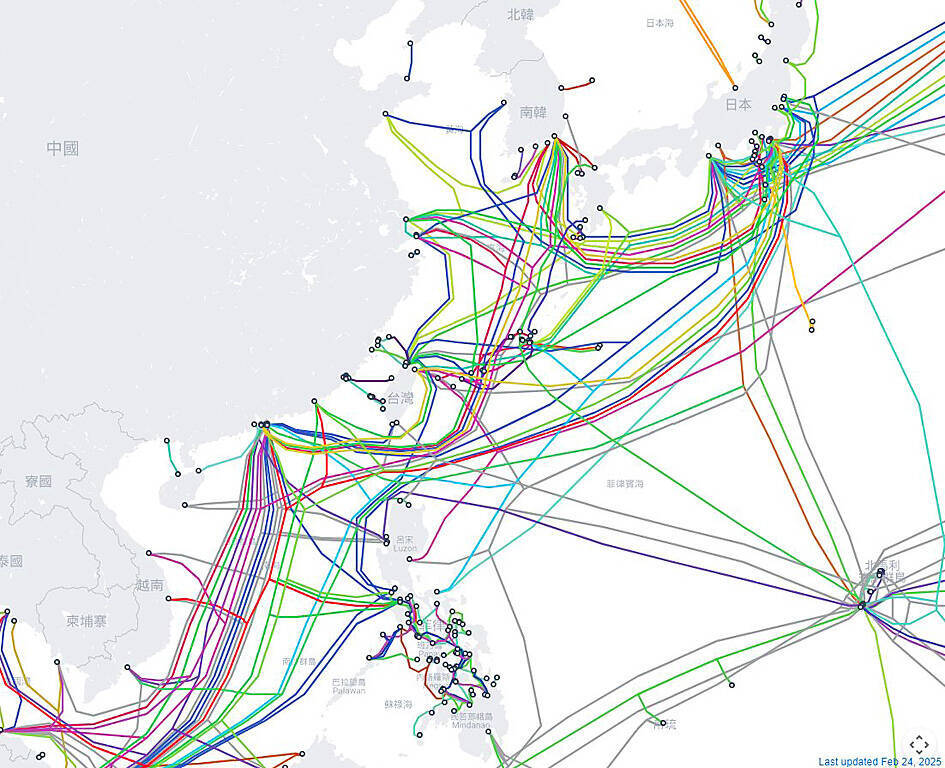The government should stipulate a specific law to manage the installation and protection of undersea cables, which should also be in sync with international laws, a recent report published by the Legislative Yuan’s Research Bureau showed.
The resilience of the nation’s communications system came under scrutiny after Togo-flagged freighter Hong Tai 58 (宏泰58號) last month allegedly damaged the No. 3 undersea cable linking Taiwan proper and the outlying island of Penghu.
Chunghwa Telecom, which builds and maintains the cable, said it has gathered evidence and would seek restitution from the culpable party.

Photo: Screen grab from TeleGeography
Another Chinese freighter, the Cameroon-registered Shunxing-39 (順興 39), allegedly damaged undersea cables off the coast of the Port of Keelung in January.
Investigations into crimes damaging undersea cables preferably begin with the immediate arrests of perpetrators, and investigators should focus on collecting evidence at the crime scene, the bureau said in the report.
“Otherwise, law enforcement personnel would be accused of negligence and malintent by shipowners, and face compensation claims arising from any arbitrary confiscation of sea vessels,” it said.
Taiwan faces great challenges when appealing cases of undersea cable damage to the international community, the bureau said.
In 1982, the UN Convention on the Law of the Sea required nations that signed the pact to stipulate in their domestic laws criminal punishment and prosecutorial mechanisms for damaging undersea cables in other countries, whether it was due to negligence or a deliberate attempt, the bureau said.
Member nations should also have regulations requiring ship owners to repair damaged undersea cables and pay compensation, it added.
“The government has no jurisdiction over flag of convenience vessels. Only the countries whose flags are carried by vessels have the right to prosecute and punish perpetrators. As Taiwan is not a member of the UN Convention on the Law of the Sea, it would be difficult for law enforcement agencies to enforce domestic laws in international waters or exclusive economic zones,” the bureau said.
The government should put in place a law on the installation and protection of undersea cables, and it should be in sync with international laws, it said.
Undersea cables around the nation were damaged seven to eight times per year in the past three years, data from the National Security Bureau (NSB) showed.
The cables were severed due to erosion, and damages caused by sand-pumping ships and trawler boats, the NSB said.
Some were also possibly damaged by the anchoring of large freighters and covert operations conducted by flag of convenience vessels, it added.
A report published by the National Audit Office in 2023 showed an increase in damaged cables, from an average of seven cases per year from 2019 to 2023, to 12 cases in 2023.
Separately, Chunghwa Telecom yesterday said it successfully repaired the No. 3 submarine cable connecting Taiwan and Lienchiang (Matsu).
However, the Taiwan-Matsu No. 2 cable and Taiwan-Penghu No. 3 cable remain disconnected, the company said, adding that they are scheduled to be repaired in the first half of this year.
The company earlier this year said that the Taiwan-Matsu No. 2 and No. 3 cables were damaged because of natural deterioration.
Additional reporting by Lin Chih-yi

A year-long renovation of Taipei’s Bangka Park (艋舺公園) began yesterday, as city workers fenced off the site and cleared out belongings left by homeless residents who had been living there. Despite protests from displaced residents, a city official defended the government’s relocation efforts, saying transitional housing has been offered. The renovation of the park in Taipei’s Wanhua District (萬華), near Longshan Temple (龍山寺), began at 9am yesterday, as about 20 homeless people packed their belongings and left after being asked to move by city personnel. Among them was a 90-year-old woman surnamed Wang (王), who last week said that she had no plans

TO BE APPEALED: The environment ministry said coal reduction goals had to be reached within two months, which was against the principle of legitimate expectation The Taipei High Administrative Court on Thursday ruled in favor of the Taichung Environmental Protection Bureau in its administrative litigation against the Ministry of Environment for the rescission of a NT$18 million fine (US$609,570) imposed by the bureau on the Taichung Power Plant in 2019 for alleged excess coal power generation. The bureau in November 2019 revised what it said was a “slip of the pen” in the text of the operating permit granted to the plant — which is run by Taiwan Power Co (Taipower) — in October 2017. The permit originally read: “reduce coal use by 40 percent from Jan.

China might accelerate its strategic actions toward Taiwan, the South China Sea and across the first island chain, after the US officially entered a military conflict with Iran, as Beijing would perceive Washington as incapable of fighting a two-front war, a military expert said yesterday. The US’ ongoing conflict with Iran is not merely an act of retaliation or a “delaying tactic,” but a strategic military campaign aimed at dismantling Tehran’s nuclear capabilities and reshaping the regional order in the Middle East, said National Defense University distinguished adjunct lecturer Holmes Liao (廖宏祥), former McDonnell Douglas Aerospace representative in Taiwan. If

‘SPEY’ REACTION: Beijing said its Eastern Theater Command ‘organized troops to monitor and guard the entire process’ of a Taiwan Strait transit China sent 74 warplanes toward Taiwan between late Thursday and early yesterday, 61 of which crossed the median line in the Taiwan Strait. It was not clear why so many planes were scrambled, said the Ministry of National Defense, which tabulated the flights. The aircraft were sent in two separate tranches, the ministry said. The Ministry of Foreign Affairs on Thursday “confirmed and welcomed” a transit by the British Royal Navy’s HMS Spey, a River-class offshore patrol vessel, through the Taiwan Strait a day earlier. The ship’s transit “once again [reaffirmed the Strait’s] status as international waters,” the foreign ministry said. “Such transits by